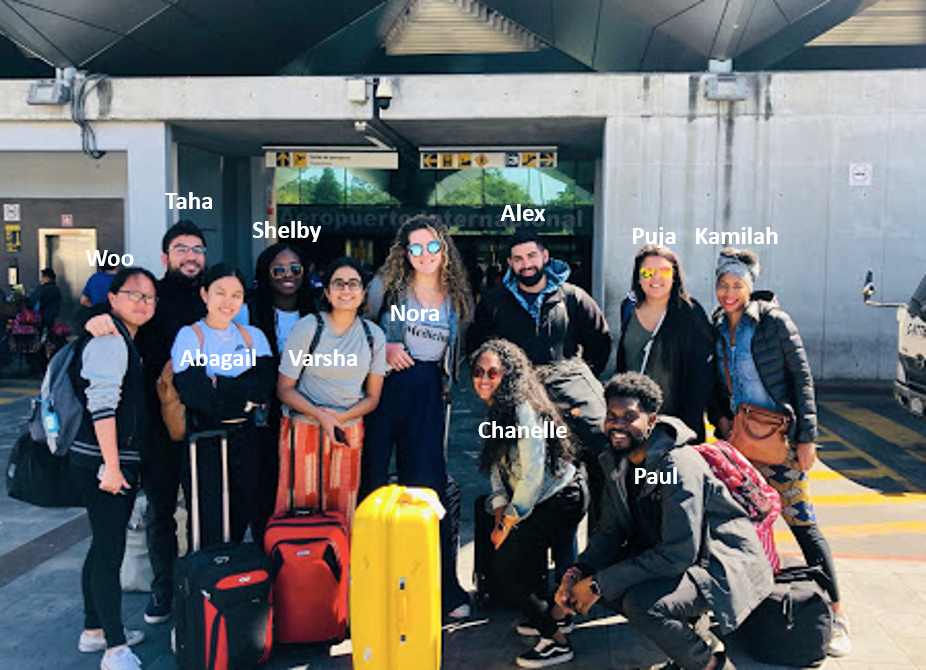From Harlem to Antigua on Winter Break
TouroCOM Students Learn About Medicine and Help Others While Hiking Volcanoes and Cooking Mole

First year Touro College of Osteopathic Medicine (TouroCOM) student, Varsha Venkatakrishna, writes about her recent mission to Guatemala, where the she and fellow TouroCOM students ran clinics for underserved populations.
Rolling her zebra patterned carry-on along the path to our Antiguan homestay, OMS II Nora Martini couldn't help voicing what we were all thinking: "How is this place even real?" After nine hours of flying, we found ourselves surrounded by vibrant flowers and cottages that would be our home for a week. It was mesmerizing; and after storing our luggage we were ready to forget the freezing temperatures in New York and begin our adventure in Antigua, Guatemala.
We were a group of ten students and one faculty member, Dr. Kamilah Ali, from Touro College of Osteopathic Medicine traveling over winter break to work at health clinics for underserved populations. In a week, we organized four clinics with the help of a local EMT and physician. It was a fulfilling experience that helped us gain new cultural perspectives and medical knowledge through service.
Our first stop was the headquarters of Maximo Nivel, the organization that planned our experience, where we received an enthusiastic welcome from incredibly friendly staff. We were given a brief orientation on the goals for the clinics, where to find the best local coffee, and told that a beautiful vista of the nearest volcano could be seen from the roof of Maximo Nivel. Before long, we were holding an impromptu photoshoot in front of Volcàn de Agua.
Providing Preventative Care, Education and Consultation
For our first day of clinic, we were picked up by the local EMT, who had extensive experience working with underserved Guatemalan communities, and a local physician who spoke only Spanish. For three of us, this was not an issue but for the rest, acclimation to language barriers in medicine would quickly surface. Our second surprise was discovering the clinics would be run entirely by us - diagnosing patients, promoting proper hygiene and dental health, distributing antiparasitics, and running the pharmacy would be handled exclusively by our team. Master’s student Chanelle Campbell found this incredibly meaningful, knowing our group would be able to work with a local EMT and doctor to provide “preventative care, education, and consultation to many people in the nearby pueblos."
We split into various stations but triaging with the physician and EMT was the collective favorite. OMS II Puja Parikh was excited to correctly diagnose giardia based on knowledge she gained from her first-year immunology class. "I was surprised at how much I retained and how many clinical cases studied in class became relevant," she said.
Each of us saw a myriad of unique cases. On one day alone, Chanelle saw uncontrolled diabetes, hypertension, ear infections, fibromyalgia from the stress of loved ones dying, carpal tunnel syndrome, psoriasis, upper respiratory infections, and pregnancy. I had a surprisingly meaningful experience with a young girl with a relatively simple cough. When asked by the physician if anything looked abnormal, I hesitantly answered “no”, after which he told me I was incorrect. What I was looking at, he said, was the yellow phlegm of bronchitis. I was learning about a throat exam for the first time, firsthand. I was never happier to be wrong.
Apart from the triage, OMS I Woo Jin Seog enjoyed interacting with the local populations. "On dental and hand hygiene days," she said, "I relayed information to younger patients in a manner that they could understand and apply to their lives." Luckily, our interactions with local Antiguans didn't stop at the clinic. From a local cooking class that indulged us in platanos en mole to learning about the conscientiously preserved culture of Mayans at the Iximche Ruins, we found our trip to be both a medical immersion and a cultural one.
The height of our experience, apart from the clinics, was a grueling hike of the Acatenango volcano, the summit of which held a view of the erupting Volcàn de Fuego. The 12-hour, 13,045 foot hike tested our physical and emotional endurance. We were all, as Chanelle put it, "laughing, crying, and wheezing, but all unified in or efforts to push ourselves to try to make it to the top. It was like medical school in a nutshell." Granted, we needed some help (read: a lot of help) from our guides, but this didn't faze our sense of accomplishment. "I realized it was a mix of willpower, craziness, and having the support of like-minded individuals around us," Chanelle said after our descent. Puja said she gained a "new appreciation of what the world has to offer."
We left New York as fellow Touro colleagues but returned as a family, a clinical team of expert mole makers and seasoned volcano climbers. We are all grateful for the experience and are looking forward to finding ways to do it again.

